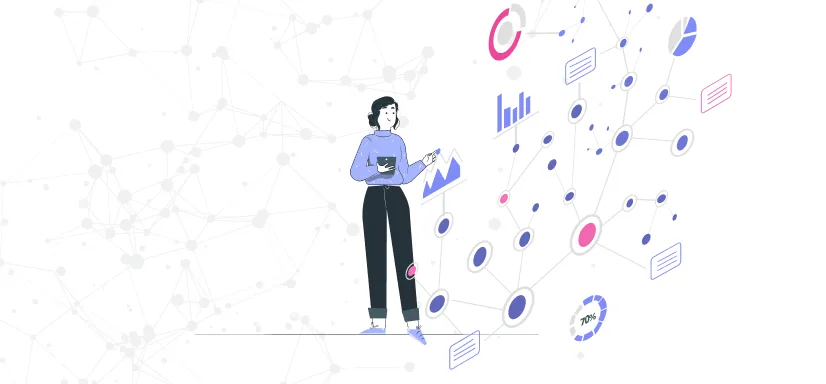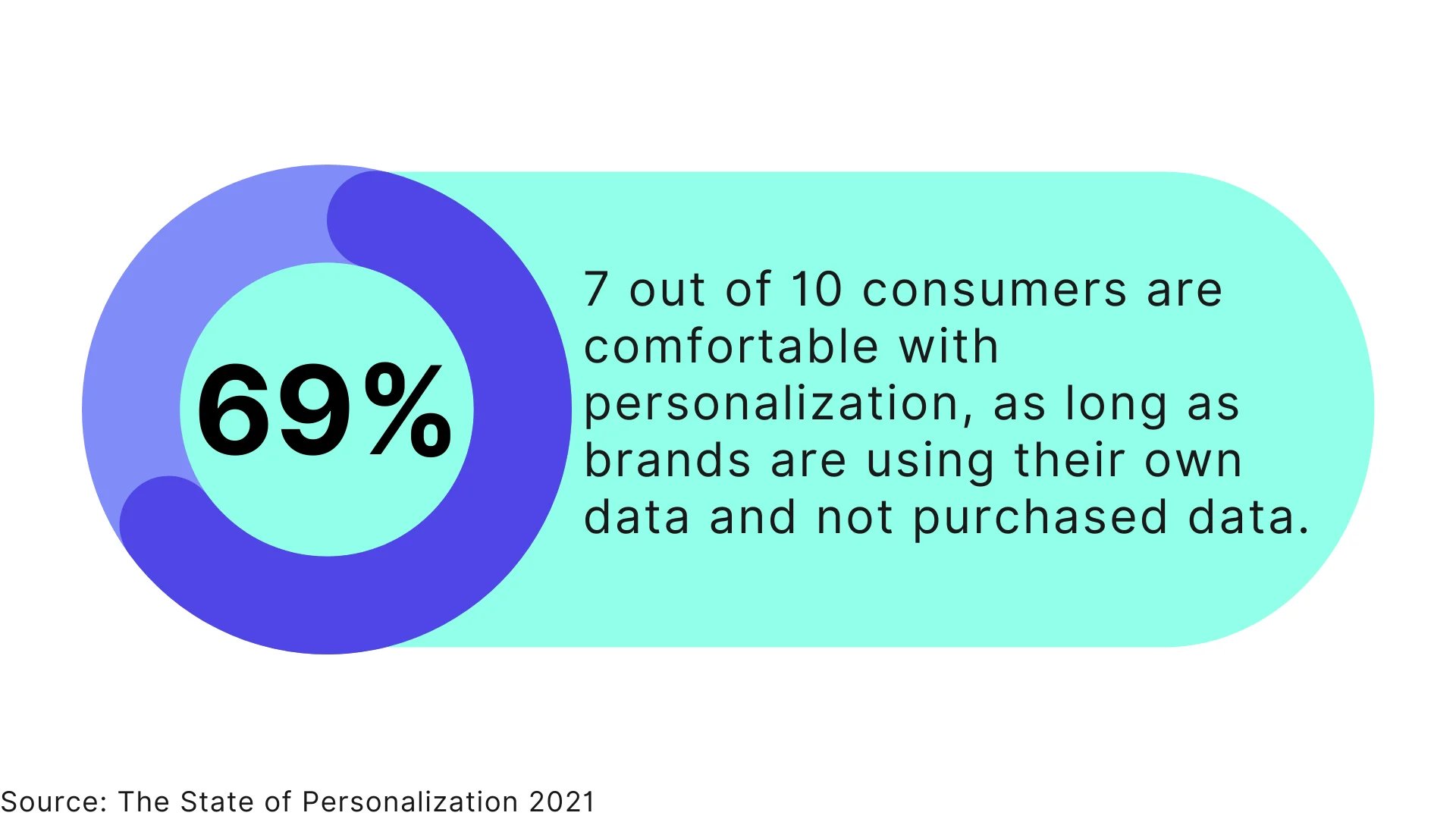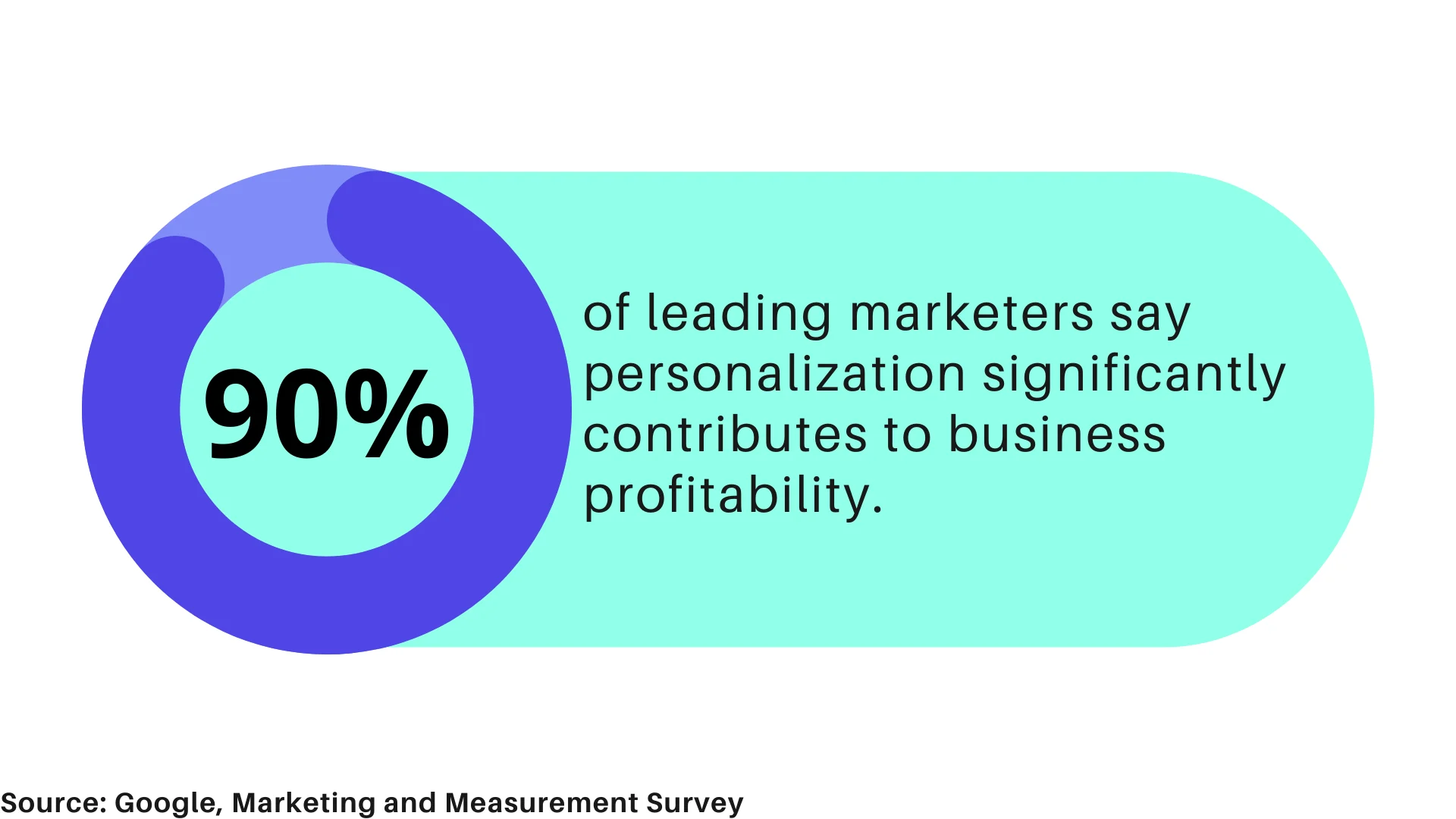- Personalization
58 Personalization Statistics & Facts for 2024 You Shouldn’t Ignore


As a business, you know that personalization is key to a successful marketing strategy.
What if I told you that, by 2024, personalization would become the norm for most businesses?
But what are the latest statistics and trends in personalization? What should you be doing to stay ahead of the curve?
And what if I told you that there are a few key statistics and facts about personalization that you shouldn’t ignore?
In this post, we've compiled, reviewed, and classified a collection of current personalization statistics to help you make the most of 2024 and beyond.
In this post, we’ll highlight the following:
Top Personalization Statistics
Website Personalization Statistics
Personalization Maturity Statistics
Personalization ROI and Conversion Statistics
Personalization and Customer Loyalty Statistics
Personalization and Data (and Privacy) Statistics
Marketing Personalization Statistics
Email Personalization Statistics
Omnichannel Personalization Statistics
B2B Personalization Statistics
Top Personalization Statistics
90% of leading marketers say personalization significantly contributes to business profitability (Google).
Personalization is appreciated by 69 percent of customers as long as it is based on data they have explicitly shared with a business (Segment).

Providing tailored experiences to customers continues to be a challenge for over two-thirds (63 percent) of digital marketing executives (Gartner).
With 80% of respondents saying they are more inclined to do business with an organization that delivers tailored experiences and 90% saying personalization is desirable (Epsilon).
Customers want businesses to understand their individual requirements and expectations, while 66% feel they are often treated like numbers (Salesforce).
91% of consumers are more likely to shop with brands that recognize, remember, and provide relevant offers and recommendations (Accenture).
More and more customers (69 percent) want a personalized and consistent customer experience across multiple channels, both physical and digital. However, few organizations are following through on it (Segment).
Personalization Maturity Statistics
1. Creating a more personalized customer experience is the top opportunity, according to 51% of marketing professionals (SmarterHQ).
2. While 85 percent of companies feel they provide personalized experiences, just 60 percent of customers believe the same (Segment).
3. According to the research, just 17 percent of marketing executives use AI/ML widely, despite the fact that 84 percent believe the technologies improve their capacity to create real-time, personalized experiences (Gartner).
4. Personalization is valued and appreciated by 93 percent of businesses (DynamicYield).
5. Personalization is considered essential for digital experiences by 75% of company executives (Segment).
6. Providing tailored experiences to customers continues to be a challenge for over two-thirds (63 percent) of digital marketing executives (Gartner).
7. Customers want businesses to understand their individual requirements and expectations, while 66% feel they are often treated like numbers (Salesforce).
8. 61% of people expect brands to tailor experiences based on their preferences (Google).
9. 79% of those in the retail industry are investing in personalization tools, which is more than any other industry (SmarterHQ).
10. Three-quarters (75%) of firm respondents agree that continuously communicating outcomes/performance/learnings is critical to building a culture of experimenting, however, only around half (51%) do so (Econsultancy).
11. Website personalization is used by 56 percent of companies (Statista).

Personalization ROI and Conversion Statistics
12. Companies that thrive at personalization earn 40% more money from these activities than the average competitor (McKinsey).
13. When consumers get push notifications or text messages for promotions they aren't interested in, 77 percent of customers are annoyed (Segment).
14. According to research, personalization often results in a 10 to 15% increase in revenue (with company-specific lift spanning 5 to 25 percent, driven by sector and ability to execute). The better a company's ability to use data to increase customer knowledge and intimacy, the higher the returns (McKinsey).
15. Companies that use advanced personalization see a return on investment of $20 for every $1 invested (Liveclicker).
16. Personalized CTAs outperform default versions by 202 percent (HubSpot).
17. Personalization can lower acquisition costs by up to 50%, improve revenues by 5 to 15%, and enhance marketing spend efficiency by 10 to 30% (McKinsey)
18. 90% of leading marketers say personalization significantly contributes to business profitability (Google).

19. 91% of consumers are more likely to shop with brands that recognize, remember, and provide relevant offers and recommendations (Accenture).
20. 52% of consumers agree that as personalized digital experiences with brands become more personalized, their satisfaction improves (Segment).
21. 64 percent of customers are okay with businesses retaining their purchase history and preferences if it means they can provide more tailored experiences (BRP Consulting).
22. The personalized homepage offers influenced 85 percent of customers to make a purchase (Instapage).
23. 80% of companies report seeing an uplift since implementing personalization (Econsultancy).
24. 90% of customers are willing to spend more with companies with personalized customer services (Zendesk).
Personalization and Customer Loyalty Statistics
25. More than a third (36%) of customers will return to a brand if they had a positive experience, even if there are cheaper or more convenient alternatives (Segment).
26. After a personalized shopping experience with a brand, 60% of shoppers think they will become repeat buyers. When Segment posed the same question to customers in 2017, just 44 percent replied the same (Segment).
27. Seventy-one percent of customers want businesses to provide personalized experiences. And 76% are frustrated when this does not occur (McKinsey).
28. If firms fail to provide a personalized experience, 45 percent of the customers say they would take their business elsewhere (Segment).
29. Over three-quarters of customers (76%) said personalized messages were essential in enhancing their consideration of a brand, and 78 percent said such communication made them more willing to repurchase (McKinsey).
30. Eighty percent of people who identify as frequent shoppers say they only purchase with businesses that tailor their experience (SmarterHQ).
31. With 80% of respondents saying they are more inclined to do business with an organization that delivers tailored experiences and 90% saying personalization is desirable (Epsilon).
32. Fifty-six percent of all online customers are more inclined to return to a website that offers product recommendations (Invesp).
33. If the online merchant doesn't deliver relevant product recommendations when customers are shopping, 47 percent will move to Amazon (SmarterHQ).
34. 66 percent of buyers think seeing non-personalized material would deter them from making a purchase (Adobe).
Personalization and Data (Privacy) Statistics
35. Personalization is appreciated by 69 percent of customers as long as it is based on data they have explicitly shared with a business (Segment).
36. Transparency in targeted advertising can increase revenue by 38% (Harvard Business Review).
37. Only 6% of businesses can properly consolidate data into a single representation of the customer for tailored experiences across channels (DynamicYield).
38. According to 55% of customers, the most crucial characteristics of a brand are trustworthiness and transparency (Segment).
39. When they get a text from a brand or retailer while walking by a physical shop, 41% of customers find it creepy (Accenture).
40. While 37% of customers trust firms to keep their personal data safe and utilize it responsibly, 37% do not trust online merchants with their personal data (Segment).
41. 90% of customers are open to disclosing their behavioral data in exchange for extra perks that make purchasing cheaper or simpler (SmarterHQ).
42. As long as their data is protected, 48 percent of customers like the comfort of personalization (Segment).
43. According to 63 percent of marketers, data-driven personalization is the hardest digital strategy to implement (eMarketer).
44. According to 80 percent of organizations, they use at least some first-party data to personalize the consumer experience (Segment).
45. The vast majority of respondents (87%) stated they would not do business with an organization if they were concerned about its security policies (McKinsey).
46. According to 53% of firms, first-party data provides them with high-quality data for personalization (Segment).
47. More than 50% of consumers are willing to share information on products they like in order to get personalized discounts (Retail TouchPoints).
Email Personalization Statistics
48. Personalized experiences, according to 71% of customers, would affect their choice to interact with emails (DynamicYield).
49. Marketers reported a 760 percent increase in earnings from segmented email marketing efforts (Campaign Monitor).
50. Personalization is thought to boost email marketing success by 96 percent of businesses (Social Media Today).
51. 37 percent of customers said that firms delivering more personalized suggestions based on their interests would make for more engaging emails (DynamicYield).
52. Using personalized subject lines in your emails increases open rates by 26% (Campaign Monitor).
53. Personalized emails result in 6x higher transaction rates, yet 70% of companies do not utilize them (MarTech).
Omnichannel Personalization Statistics
54. Only 24% of firms report they are effectively investing in omnichannel personalization, with departmental silos and outdated technology being the main impediments to success (Segment).
55. 43 percent of companies perceive accurate, real-time customer data as the most difficult hurdle to their personalization efforts, while another 29 percent struggle with providing internal teams with a single source of truth (Segment).
56. More and more customers (69 percent) want a personalized and consistent customer experience across multiple channels, both physical and digital. However, few organizations are following through on it (Segment).
57. According to 21% of firms, technology and data are roadblocks to omnichannel personalization success (Segment).
58. 21 percent of firms believe they don't see a return on investment from omnichannel personalization (Segment).
The Bottom Line
I hope you found useful information in the numbers shown above. After all, looking for data-driven solutions to your marketing hypothesis is usually a smart idea.
But keep in mind that any figure should be taken into context. Statistics are oversimplifications of just a subset of reality. They are also not always methodologically sound:
small sample sizes,
misleading correlations,
and so on.
So, if you've just seen data that contradicts your professional marketing expertise, don't abandon your content strategy just yet.
Instead, explore a little deeper.
Learn how to deliver unique and personalized customer experiences to increase conversions
